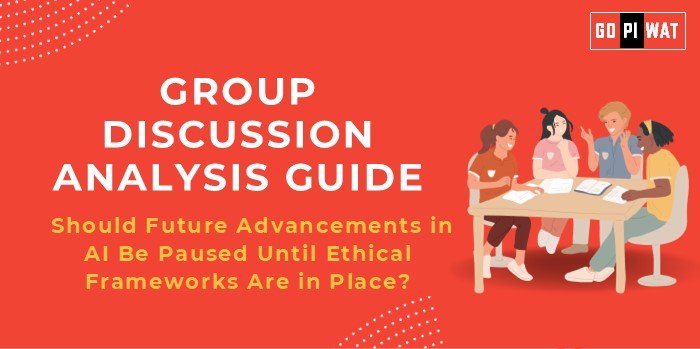📋 Group Discussion Analysis Guide: Should Future Advancements in AI Be Paused Until Ethical Frameworks Are in Place?
🌐 Introduction to the Topic
Opening Context:
Artificial Intelligence (AI) is rapidly transforming industries, economies, and daily life. As AI becomes more capable, ethical dilemmas about its applications and consequences are escalating globally.
Topic Background:
The concept of pausing AI development to establish ethical frameworks gained prominence in 2023 when over 1,000 AI experts, including Elon Musk and Steve Wozniak, signed an open letter urging a six-month moratorium on AI advancements. Their argument revolved around the potential risks posed by unregulated, powerful AI systems to society, economies, and global security.
📊 Quick Facts and Key Statistics
- 📈 AI Contribution to GDP: $15.7 trillion by 2030 (PwC report).
Significance: Highlights AI’s economic potential. - 🛠️ Jobs Impact: Automation risks displacing 375 million jobs globally by 2030 (McKinsey).
Significance: Underlines societal disruption potential. - 🔒 AI Safety Incidents: 62% of AI developers lack robust risk assessment protocols (Stanford AI Index).
Significance: Shows gaps in ethical safeguards. - 🏛️ Government Regulation: 15 countries have national AI strategies, but only 4 have comprehensive ethics frameworks.
Significance: Reflects regulatory lag.
🧩 Stakeholders and Their Roles
- 🏛️ Governments: Develop regulations to balance innovation with public safety.
- 💼 Tech Companies: Responsible for transparent, ethical AI development.
- 📚 Academia and Think Tanks: Provide independent research and recommendations.
- 👥 Civil Society: Advocate for equitable and inclusive AI policies.
- 🌍 International Bodies: Facilitate global ethical standards (e.g., UN, OECD).
🏆 Achievements and Challenges
✨ Achievements:
- 🩺 Medical Advancements: AI-driven early cancer detection models improved accuracy by 25%.
- 📊 Economic Growth: AI contributed 14% of GDP growth in AI-first nations like the US.
- 🌱 Environmental Solutions: AI systems optimized 30% energy savings in smart cities globally.
⚠️ Challenges:
- ⚖️ Bias and Inequality: AI systems like facial recognition exhibit racial and gender biases.
- 🔄 Job Displacement: The automation of repetitive tasks threatens employment in key sectors.
- 🔒 Safety Risks: Incidents like GPT-induced misinformation and AI-enabled cyberattacks highlight vulnerabilities.
🌎 Global Comparisons:
- 🇪🇺 Success: The EU’s AI Act leads in ethical AI policy frameworks.
- 🇨🇳 Challenges: China’s rapid AI growth has faced criticism for privacy violations.
Case Study: The National AI Initiative Act of 2020 (US) showcases efforts to align development with ethical norms.
💬 Structured Arguments for Discussion
- Supporting Stance: “Pausing AI development ensures ethical safeguards are embedded before irreversible impacts occur.”
- Opposing Stance: “A pause on AI advancement risks stifling innovation and losing competitive advantage.”
- Balanced Perspective: “Advancing AI cautiously, with iterative ethical assessments, could strike the right balance.”
📚 Effective Discussion Approaches
Opening Approaches:
- 📊 Statistical Impact: “With AI poised to add $15.7 trillion to the global economy, how do we address its associated risks?”
- 🤔 Ethical Dilemma: “Should we risk societal harm to innovate AI further?”
Counter-Argument Handling:
- ✔️ Example: “While pausing AI could hinder progress, the AI safety concerns highlighted by the 2022 LaMDA controversy underscore the need for preemptive action.”
📈 Strategic Analysis of Strengths and Weaknesses
- ✔️ Strengths: AI’s economic potential, problem-solving capacity in healthcare and energy.
- ❌ Weaknesses: Lack of regulatory frameworks, inherent biases in algorithms.
- 💡 Opportunities: Establish global ethical leadership, develop equitable policies.
- ⚠️ Threats: Misuse in warfare, widening socio-economic gaps.
🏫 Connecting with B-School Applications
Real-World Applications:
- 🌟 AI’s role in strategy projects on business ethics and technology management.
Sample Questions:
- ❓ “How can businesses balance AI innovation with ethical responsibilities?”
- ❓ “Discuss the role of ethics in AI governance and its relevance to future business leaders.”
Insights:
- 💼 Students should research the intersection of AI and sustainable business.
- 📊 Ethical AI development offers scope for leadership roles in policy-making.


